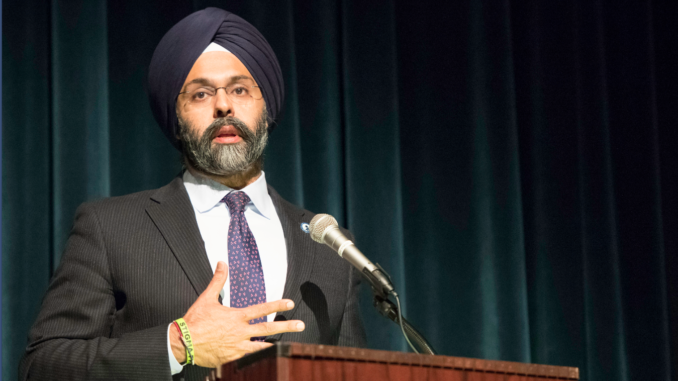
TRENTON—New Jersey’s top cop has issued a directive promoting the emotional and mental well-being of the state’s law enforcement officers.
The directive creates the nation’s first statewide resiliency program and establishes the first statewide chief resiliency officer.
The move is intended to ensure officers are provided with the tools they need to cope with the unique stressors of their jobs.
Addressing a rise in reported police suicides nationwide, Attorney General Gurbir Grewal issued the directive Aug. 6. He said the program, requiring every law enforcement officer in the state to be trained in the NJRP-LE by the end of 2022, is a two-day training with a mix of lectures and practical exercises.
Grewal said the program will help officers become better equipped to handle the daily stress of police work that, when left unchecked, can lead to physical ailments, depression, and burnout.
All state, county, and municipal law enforcement agencies will designate a Resiliency Program Officer (RPO) who will be trained in—and ultimately train their departments in—resiliency.
Grewal named Robert Czepiel, the chief of the Prosecutors Supervision and Training Bureau in the Division of Criminal Justice, as the state’s first chief resiliency officer, responsible for overseeing the statewide program.
The directive grew from the efforts of a working group that included representatives from the Division of Criminal Justice, Burlington County Prosecutor’s Office, Ocean County Prosecutor’s Office, New Jersey State Police, Acadia Healthcare, The New Jersey Chaplains Association, Atlantic County Sheriff’s Department, Maple Shade Police Department and the New Jersey Division of Mental Health and Addiction Services.
“We cannot fully comprehend the emotional and mental stress that our law enforcement officers suffer on a daily basis,” Grewal said.
“We owe it to them to not only combat the stigma associated with seeking help, but also to give them the tools they need to deal with the stress and trauma they endure,” he added.
Grewal said, “It is our hope that this first-in-the-nation program will serve as a first line of communication allowing officers to unburden job stresses and provide them with the support they deserve. We can no longer allow them to suffer in silence.”
Job stress also puts law enforcement officers at a higher risk for health- and social-related issues, such as high blood pressure, heart disease, diabetes, substance misuse, family and relationship stress, and self-harm.
In April, Hillsdale Police Capt. Sean Smith told Pascack Press—in a feature about his having recently graduated the FBI National Academy—that he was working to institute a wellness policy for the department.
He said he was shaping a program whereby officers would check in with a psychologist once a year “and talk about the stresses of the job, if they choose to do that.”
He also said he had his sights set on a more rigorous physical fitness program for the department.
“Officer wellness has reached a critical stage nationally where police suicides have trumped officer shootings,” he said, taking in departments large and small.
Smith suggested officers are Type-A folks who are taught to go out into dangerous and ugly situations, witnessing, interceding in, and absorbing physical and emotional trauma—including involving children—that most citizens can’t truly imagine.
“How do you process these critical incidents and carry on? Although we don a uniform and a badge we’re all human and we suffer from human vulnerabilities,” he said.
Grewal’s office cited a recent white paper commissioned by the Ruderman Family Foundation, a philanthropic organization, observing that police officers are more likely to die by suicide than in the line of duty.
According to Blue H.E.L.P., a nonprofit organization that tracks and monitors law enforcement suicides, at least 167 officers died by suicide last year, more than the total number of line-of-duty deaths.
In New Jersey, according to this organization, 37 law enforcement officers reportedly have died by suicide since 2016. These statistics are believed to be conservative because law enforcement suicides have been historically underreported.
The NJRP-LE is designed to change a culture in which officers are often reluctant to seek help for work-related stress. The program fosters an environment that encourages officers to communicate with each other and with their families.
Rather than “spiraling down,” officers are provided with techniques and services that help them to “spiral up” and meet day-to-day challenges.
The program emphasizes officers’ positive strengths, rather than their weaknesses. Based upon the belief that people are not born resilient but rather learn to be resilient through life experiences, the NJRP-LE promotes and encourages a “growth mindset,” as opposed to a restrictive “fixed mindset.”
W. Fox, president of the New Jersey State Fraternal Order of Police, thanked Grewal for working hard to put this resiliency program together with the help of all state law enforcement groups.
“This program is well overdue to protect our officers that protect our citizens every day. It is quickly forgotten by the public how dealing with tragedies, such as our last two recent ones, in El Paso and Dayton, will haunt these officers during their careers and have lasting effects on them and their families,” Fox said.
He added, “I would like to thank Attorney General Grewal from the members of the New Jersey State Fraternal Order of Police.”
